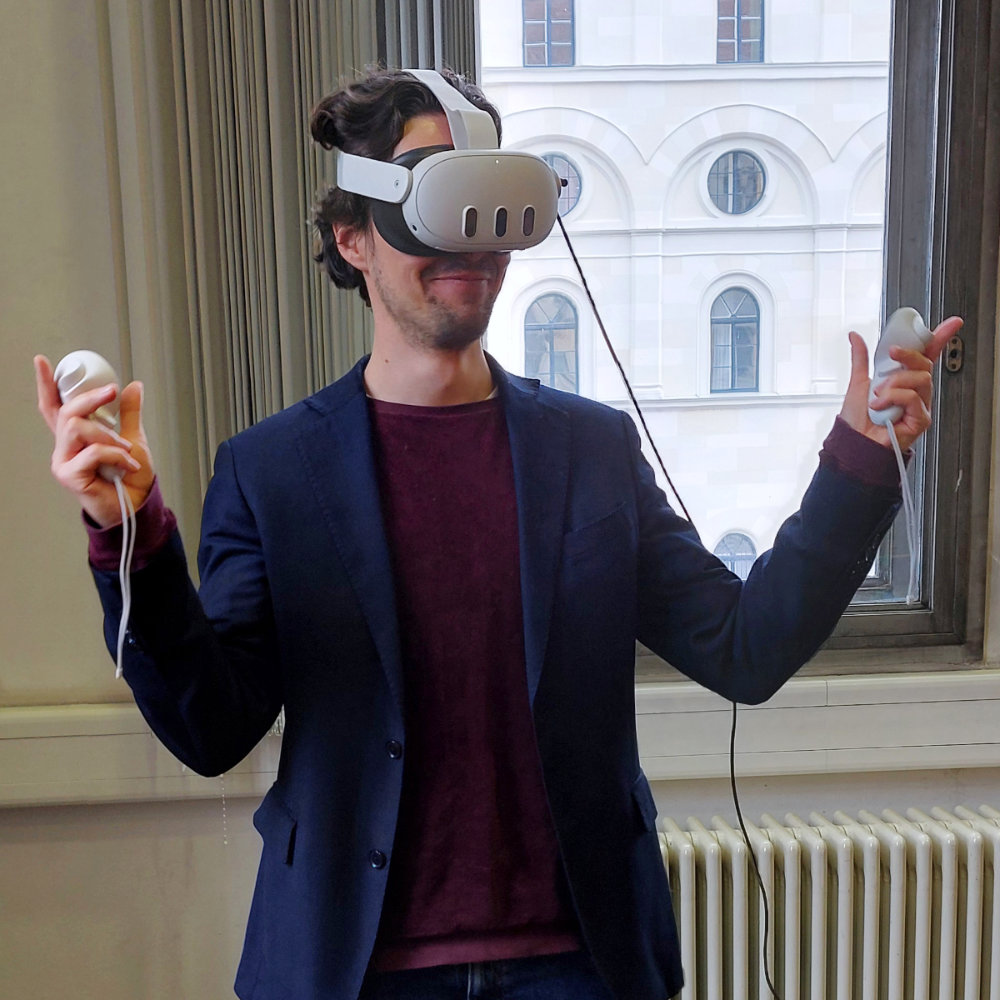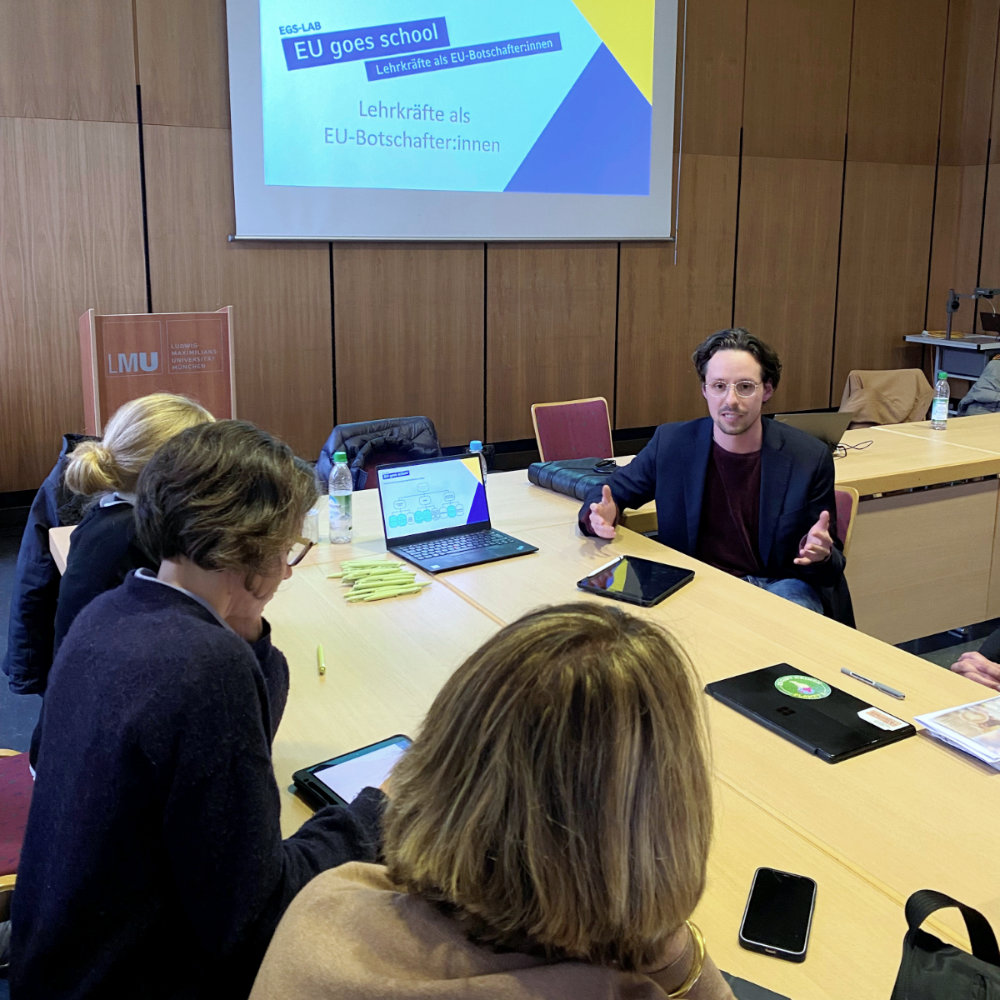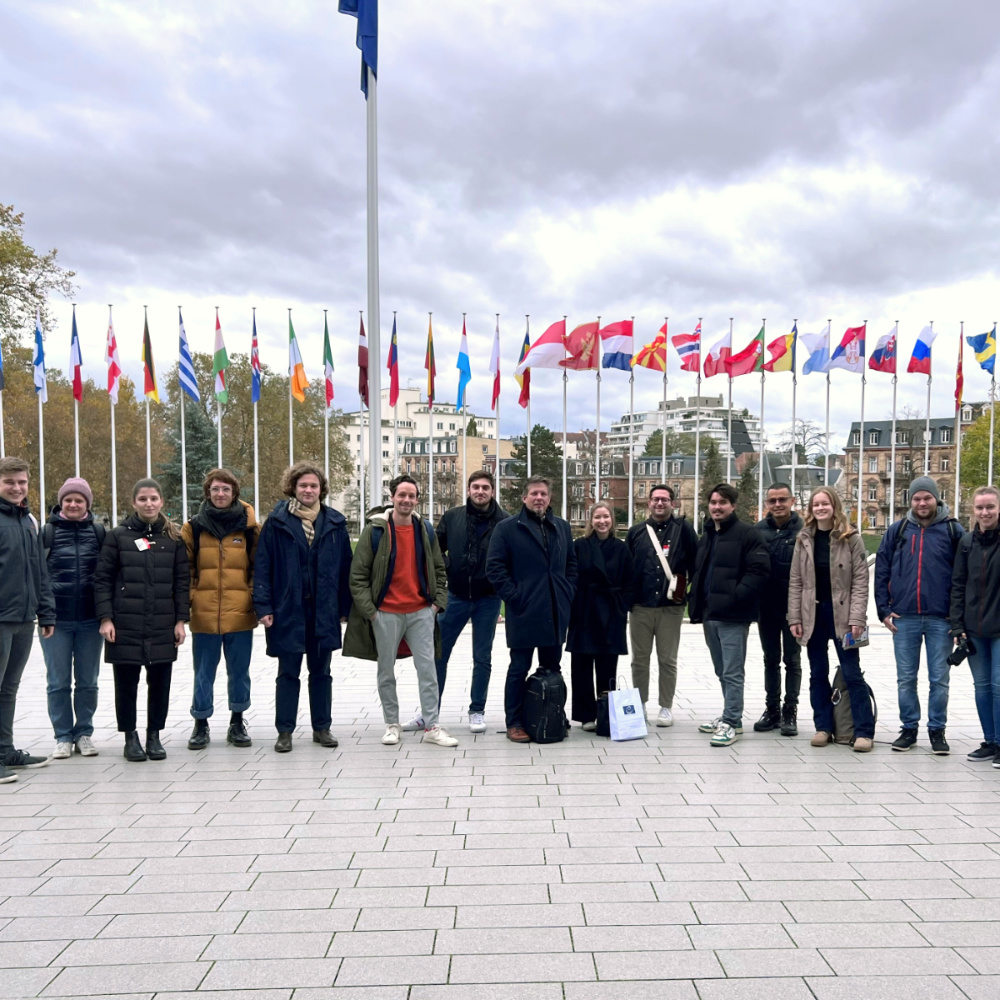With a view to the second phase of funding next year, we take a look at the project’s achievements to date and the steps ahead.
As part of the EU Commission’s “Jean Monnet – Teacher Training” funding line, the Munich Center for Teacher Training (MZL) has been leading the project “EU goes school – Teachers as EU Ambassadors (EGS-LAB)” since March 2022. Supported by the Chair for Political Education and Didactics for social studies at the Department of Political Science at LMU (GSI), the project aims to encourage (student) teachers to reflect on their attitudes towards Europe and build up conceptual knowledge about the EU and its functioning. In addition, this target group is supported in expanding their teaching skills in order to offer their students learning opportunities about the EU. In this way, the project contributes to the development of a European identity among teachers so that they can create high-quality lessons about Europe and the EU. This in turn should lead to the promotion of a European identity among their pupils as well.
In order to achieve these project goals, various measures have been planned.
E-learning course: learning experience in virtual reality

Initially, an e-learning course was developed that can be completed in self-study so that users can develop a better understanding of the structure and functioning of the EU and strengthen their ability to make political judgments and take political action. The course offers an immersive and comprehensive learning experience in virtual reality (VR) on an open source platform. By merging advanced technology, carefully crafted content and didactic tools, this platform enables a deep exploration of the European Union. Participants engage with the history, institutions and decision-making processes of the EU through seven interactive modules. These modules are designed to be reminiscent of a museum tour with different impressions. Accordingly, they are connected via a central “hall” where the course begins. The visitor then chooses a topic about which he or she would like to learn more. Learning objectives in form of questions are provided at the beginning of each module and offer an initial overview. This is followed by various media such as texts, audio files or videos that provide extensive information on the topic. In-depth learning is also possible through links to external resources that offer the opportunity to delve further into the topics. At the end of the modules there is an opportunity for self-assessment. Users can gain practical insights into the complex dynamics of the European Union through this innovative approach to EU education. Personalized progress tracking also ensures adaptive learning.
Seminar and excursion: “EU goes School! How can the EU be taught in the classroom?”

In the winter semester 2023/24, the GSI also hosted the seminar “EU goes School! How can the EU be taught in the classroom?”. In cooperation with a seminar for elementary school from the 2nd phase of teacher training, the event specifically addressed the question of how the topic of Europe can be implemented in the classroom. To this end, an excursion to Strasbourg was planned and carried out in November 2023. The aim of the excursion was to learn about the history of Alsace and the associated connections between the two neighboring countries of Germany and France as well as the basic European idea. In addition, a selection of extracurricular places of learning – such as the European Parliament and the Council of Europe – were visited and reflected on in terms of the didactic added value for the pupils. The students then developed lessons on the topic of Europe together with the trainee teachers. These were then put into practice, evaluated and revised. The adapted version of the teaching units was summarized in a handbook in combination with the corresponding didactic comments. Both outputs will be made available to the general public on an open source platform in both German and English at the beginning of December 2024. By participating in the seminar, the participants became experts in the teaching units they developed and acquired both conceptual and didactic-methodological knowledge about the EU and the teaching of EU topics in the classroom.
“Train the trainer”: teacher training for the training of multipliers

Another component of the project is to develop a multiplier program. The aim of this program is to disseminate the project results and reach as many teachers as possible. A teacher training course in April 2024 was the first step in informing teachers from different types of schools and training them as multipliers in line with the “train the trainer” principle: These teachers can take their knowledge back to their school, pass it on to their colleagues and their class and thus provide new impulses in terms of EU and democracy education in a broader sense. After a welcome and brief presentation of the “EGS-LAB” project by the MZL, Dr. Andreas Kalina from the Academy for Political Education in Tutzing opened the content part of the training with his presentation on the challenges of the European community of values and law. In the second part of the training course, speakers Fabian Heindl and Nils Preissner from GSI discussed the importance of communicating the complex multi-level EU system in schools at an early stage, especially after the voting age was lowered to 16. At this point, the individual elements of the “EGS-LAB” project and their possibilities for teacher training were highlighted and the use of these in the school or classroom was also clarified. The final workshop part of the event offered teachers the opportunity to analyze materials from different types of schools, exchange ideas and try out practical methods for teaching. The training course met with a very positive response. Furthermore, the multiplier program is to be expanded even further. To this end, an internal area for interested parties is to be created on the above-mentioned digital platform. The establishment of a certificate program for EU ambassadors will also promote this goal. The certificate program will include the e-learning course, participation in the seminar or at least two training courses and an event on attitudes towards the EU. The corresponding workshops are currently being prepared.
The project is entering a new round
Many of the objectives have already been achieved during the project to date. With the start of the second funding phase in January 2025 (EGS-LAB 2.0) and the associated financial support from the EU, the results achieved can now be further expanded in the future and additional resources can be provided for the further training of teachers. In particular, the aim here will be to expand the digital learning platform (XR-Hub) to include subject-specific didactic content and methods in order to enable school-specific strategies and approaches for contemporary teaching on the EU. In addition, two seminars with excursions to extracurricular EU learning locations will take place in order to promote cooperation between student teachers and trainee teachers and to offer them the opportunity to critically reflect on their role as (future) teachers. Another important element of this continuation is the introduction of a podcast, which will serve as an innovative format for knowledge transfer. This podcast will not only address current topics in EU and democracy education, but will also act as a platform for the exchange of best practices and experiences among teachers, aiming for a broader reach and a deeper engagement with European issues.
